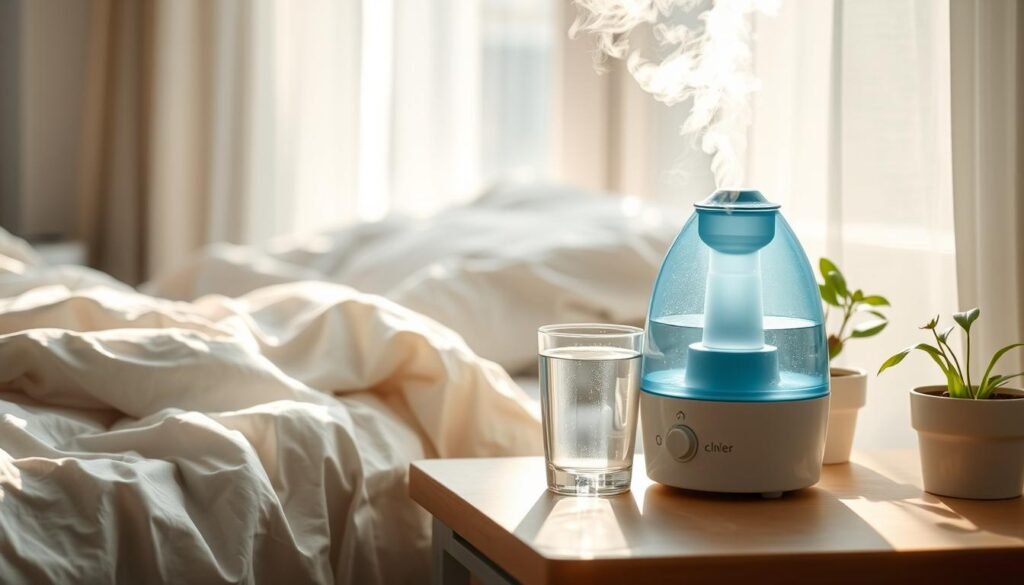Adults catch 2 to 4 colds yearly, according to the CDC. Children may get up to 10. This shows how common colds, flu, and allergies are, and why effective fatigue treatments are needed. Symptoms often drain energy and disrupt day-to-day activities. Many turn to natural remedies, home treatments, and vitamins for help. This article discusses scientifically proven ways to speed up recovery and ease discomfort.
Key Takeaways
- Cold, flu, and allergy symptoms can greatly affect daily life, causing fatigue.
- Natural remedies and home remedies can alleviate symptoms and aid recovery.
- Hydration and rest are essential in managing cold and flu fatigue.
- Vitamin supplements may help shorten illness duration and boost immunity.
- Be cautious with over-the-counter medications, especially for children.
- Personalized care and attention to symptoms can improve comfort and well-being.
Understanding Cold, Flu, and Allergy Fatigue
Colds, the flu, and allergies can make you feel very tired. They mess with your energy, making daily tasks hard. Our body fights off cold and flu germs by releasing certain chemicals. These chemicals make us feel tired as our body battles the virus.
Allergy tiredness is a bit different. Our body fights allergens with histamines, causing swelling and tiredness. Symptoms like itchy eyes and a stuffy nose make us feel even more tired. Knowing what causes this tiredness helps us keep our energy up.
Cold and flu symptoms often go away in two weeks. But, allergy symptoms can last a lot longer, leading to ongoing tiredness. If allergies are wearing you out, treatments like antihistamines might help. These can lessen your symptoms and help you feel more energetic.
The following table shows the differences between cold, flu, and allergy symptoms and their tiredness levels:
| Condition | Typical Duration | Common Symptoms | Fatigue Level |
|---|---|---|---|
| Common Cold | 3-10 days | Runny nose, sneezing, mild cough | Moderate |
| Flu | 4-7 days | High fever, fatigue, aches | High |
| Allergies | Weeks (during pollen seasons) | Itchy eyes, nasal congestion | Variable |
Common Symptoms of Cold, Flu, and Allergies
It’s important to know the signs of colds, flu, and allergies. Each has unique and shared symptoms.
A table below shows how they differ and overlap:
| Symptom | Cold Symptoms | Flu Symptoms | Allergy Symptoms |
|---|---|---|---|
| Fever | Rare | High (102-104°F), lasting 3-4 days | Absent |
| Occurrence Rate | 3-4 times yearly | Once yearly | Seasonally/Repeatedly |
| Fatigue Duration | Quite mild | Can last up to 2-3 weeks | Can vary with allergy triggers |
| Headache Severity | Rare | Prominent | Common |
| Chest Discomfort & Cough | Mild to moderate, hacking cough | Common, can become severe | Sometimes |
| Sneezing | Usual | Sometimes | Common |
| Itchy Eyes | Rare | Rare | Usually present |
| Sore Throat | Common | Rare | Rare |
| Runny/Stuffy Nose | Usual | Sometimes | Usual |
Fatigue can happen with any of these conditions, but it varies a lot.
Colds come slowly, but flu hits fast and hard. Allergies can drag on, especially in pollen season.
Knowing these symptoms helps you make wise health choices. It leads to better management and quicker recovery.
Importance of Rest and Sleep for Recovery
Getting enough rest is crucial when dealing with cold, flu, and allergies. Quality sleep boosts the immune system, helping it fight off illness. When we sleep, our body’s defense mechanisms, like T cells and certain cytokines, become more active.
For our bodies to fight fatigue, healthy sleep patterns are key. Studies have found that being alert and having strong immune cells happen mostly during daylight. Sleep at night helps T cells work better in our bodies. Not getting enough rest hurts our body’s ability to defend itself.
By improving sleep habits, we can improve our health. Doing simple things like sticking to a regular sleep schedule helps a lot. Also, making our sleeping area comfortable and avoiding caffeine before bed is good. Knowing how sleep affects our immune system can help us recover faster from illnesses.
Hydration: A Key Factor in Symptom Management
Keeping hydrated is crucial when you’re feeling under the weather. Not drinking enough can make you more tired. It can also make stuffy noses worse. Drinking plenty of fluids is key, especially if you have a fever, which causes you to sweat more.

Adults should drink about 6 to 8 glasses of fluid a day. When you’re sick, you might need even more. Water, juice, and drinks with electrolytes are good to drink. Eating fruits and veggies like grapes, oranges, and celery can also help keep you hydrated.
Try to cut back on coffee, tea, soda, and alcohol when you’re ill. These drinks can make dehydration worse. Staying hydrated helps your body handle symptoms better. This includes making it easier to fight off the cold by producing mucus and histamines.
- Stay hydrated with clear liquids to prevent dehydration.
- Avoid caffeinated and alcoholic drinks during illness.
- Incorporate water-rich fruits and vegetables into your diet.
- Monitor fluid intake closely, especially during fever.
Focusing on hydration and how much you drink can help with cold symptoms. Drinking enough fluids can reduce tiredness. It also helps your body fight off the illness more effectively.
Treatments for Cold, Flu, and Allergy-Induced Fatigue
Fighting fatigue from colds, flu, and allergies means using different treatments. There are plenty of options out there, from medicines you can buy at the store to natural solutions. Knowing what’s available helps people find the best way to feel better, speed up recovery, and improve their overall health.
Over-the-Counter Medicines
To get relief fast, lots of people use medicines they can buy without a prescription. Some popular choices are:
- Antihistamines help with allergy symptoms like sneezing and a runny nose. Older versions might make you sleepy, but newer ones like Zyrtec® and Claritin® probably won’t.
- Decongestants, such as nasal sprays, can quickly ease a stuffy nose by reducing swelling.
- Pain relievers such as acetaminophen and ibuprofen work well for headaches, body aches, and fevers.
It’s key to stick to the suggested dose for these medicines, as taking too much can cause problems, like high blood pressure.
Natural Remedies for Relief
Besides medicines, natural remedies are also favored for relief. Things like saline nasal washes can clear out mucus and allergens. This makes breathing easier. Herbal teas can calm and hydrate the body, aiding in combating symptoms.
Vitamins and Supplements to Consider
Vitamins boost our immunity. Taking vitamin C and Quercetin can make our body’s defense against colds and allergies stronger. Adding these supplements to our daily routine can lessen symptoms, making them important for our health.
For extra help with managing symptoms and treatment options, check out this resource.
Home Remedies for Cold and Flu Relief
Many people look for home remedies when they get a cold or flu. These remedies can ease mild to moderate symptoms. Let’s explore some effective ways to find comfort and promote natural recovery.
Warm Liquids and Soups
Research shows warm liquids can relieve upper respiratory infection symptoms. Chicken soup is especially good for this. It hydrates and soothes sore throats. Adding ginger or garlic can further boost its soothing effects. This makes it a popular choice in cold weather.
Saline Nasal Irrigation
Using saline nasal irrigation helps with stuffiness and drainage. It clears thick mucus and may prevent sinus infections. You can make a saline solution with salt and warm water. Use it in a neti pot or a spray bottle. Doing this regularly can help you breathe more easily. It’s a handy remedy for colds and the flu.
Honey for Soothing Coughs and Throats
Honey is an old-school remedy for a sore throat and cough. Take it with warm water or by itself for quick relief. Its natural qualities soothe the throat. Honey is very effective but remember, it’s not for kids under one year old. They could get sick from botulism.

Essential Oils for Allergy Symptom Relief
Essential oils are a natural way to ease allergy symptoms. Peppermint and eucalyptus oils are great for fighting inflammation. You can breathe them in or apply them to your skin. This approach offers a natural alternative for allergy relief.
Aromatherapy uses essential oils to create a calming environment. It can help lessen allergy discomfort. By mixing oils, you can get even stronger effects. There are special mixes to boost your immune system or help you relax, which can also help with allergies.
When using essential oils, safety is key. Make sure the oils are pure and high quality. Talk to a doctor before you start using essential oils, especially if you have other health issues or are pregnant. Essential oils can be part of a larger plan to manage allergies.
For detailed advice on using essential oils, visit essential oils for allergies. Dealing with allergies is tough, but aromatherapy and natural remedies offer new ways to improve your health.
Allergy Management: Preventing Exacerbation of Symptoms
To manage allergies well, it’s vital to be proactive. Using HEPA filters helps a lot. These filters catch dust mites, pet dander, and pollen. This action lowers the chance of having hay fever attacks.
Knowing what triggers your allergies is key. If tree or grass pollen bothers you, know when they peak. Clean your home well. Use dust and vacuum filters that catch allergens. This makes your home healthier.
Think about the clothes you wear and what you do outdoors. Wearing a mask and showering after being outside helps. Also, keep windows shut when there’s a lot of pollen.
Along with making changes at home, taking allergy meds is crucial. See an allergist regularly. They can adjust your allergy management plan for better relief.

| Common Allergens | Possible Symptoms | Management Techniques |
|---|---|---|
| Pollen | Sneezing, itchy eyes, congestion | Limit outdoor activities during high pollen days |
| Dust Mites | Runny nose, sinus pressure, fatigue | Use allergen-proof mattress and pillow covers |
| Pet Dander | Itchy eyes, coughing, body aches | Keep pets out of bedrooms; use HEPA filters |
| Mold | Congestion, sneezing, fatigue | Fix leaks and reduce humidity in the home |
Putting these tips into action can lessen symptoms. It also boosts overall health. This lets people enjoy life more, free from allergy worries.
Healthy Eating to Boost Immunity
A strong immune system helps us beat colds, flu, and allergies. Eating well is key to building this defense. Foods high in vitamin C and quercetin are especially good for immunity.
Vitamin-C-rich Foods
Foods with vitamin C boost our immune system. Eat lots of:
- Citrus fruits (oranges, grapefruits, lemons)
- Kiwis
- Bell peppers
- Berries
- Leafy greens (spinach, kale)
These help fight infections by making more white blood cells. Experts say eating foods rich in vitamin C is crucial. Without enough of it, our immune system can weaken.
Quercetin Sources and Benefits
Quercetin is a strong antioxidant. It helps lessen inflammation and boosts immunity. You can find it in:
- Onions
- Apples
- Berries
- Citrus fruits
- Green tea
Add quercetin-rich foods to your meals for better health. Eating foods with both vitamin C and quercetin is advised for immune support.
Knowing about vitamins like zinc, selenium, and vitamin D is helpful too. They boost immunity as well. For more insights on nutrients and immunity, visit this link.
Conclusion
Dealing with fatigue from colds, flu, and allergies means doing a few key things. First, you need good rest and to drink plenty of water. You also need to find treatments that work and take steps to avoid getting sick. This article has shared tips on how to manage these symptoms and feel better.
For natural ways to beat fatigue, there’s a lot you can try. Drinking water, eating foods full of vitamins, and using honey and essential oils can help. These tips are meant to help you feel more in control of your health when you’re sick.
It’s all about a balanced strategy. Knowing the symptoms is just the start. To really keep colds, flu, and allergies at bay, you need a strong immune system. Making healthy choices every day is key to fighting off these season issues.